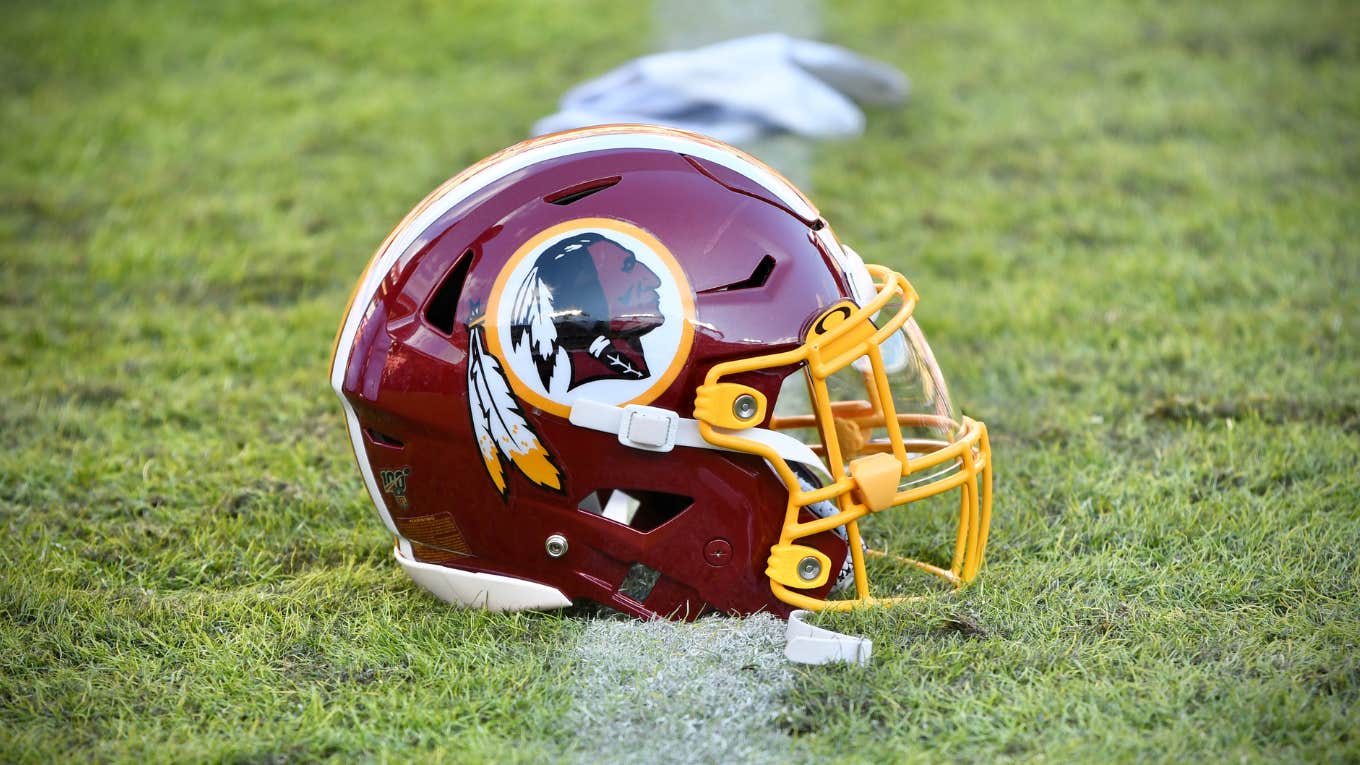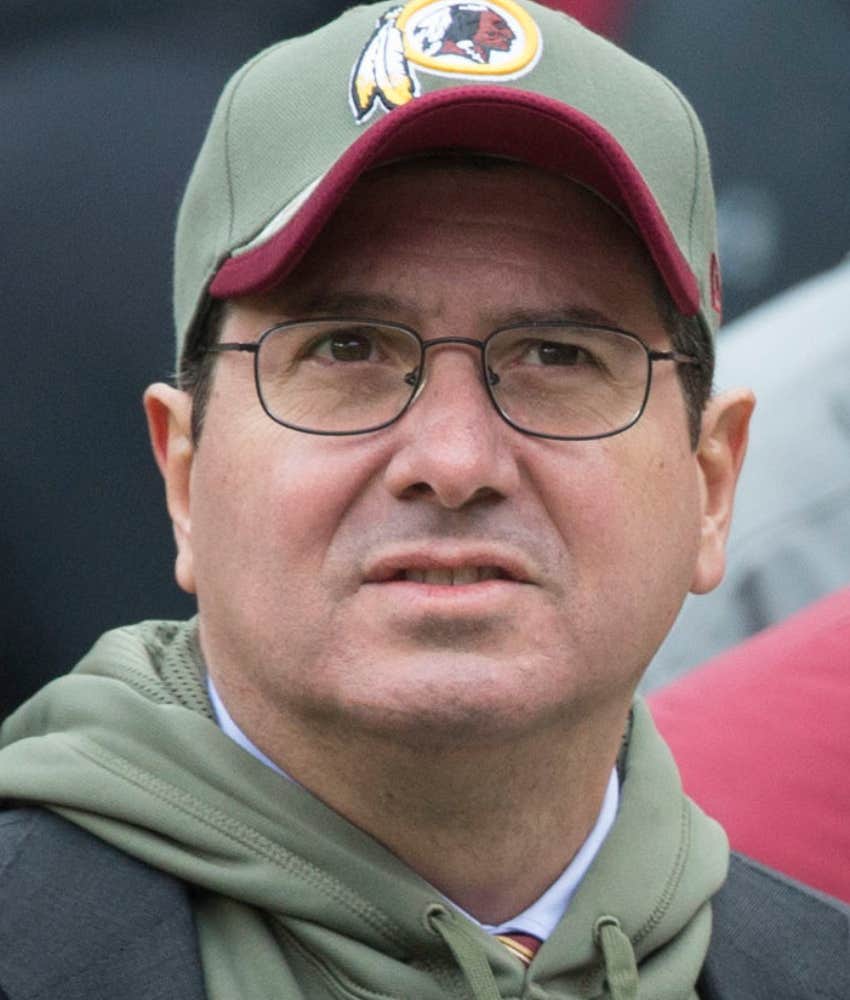Why The Face Of The NFL Commanders Was ‘Canceled’ Despite 90% Of Native Americans Reportedly Supporting The Team’s Former Name
A struggle is erupting over whether to change the name and logo back. What is behind it, and who should decide?
 All-Pro Reels | Wikimedia Commons
All-Pro Reels | Wikimedia Commons The Washington Commanders NFL team is once again at the center of a debate over the U.S.'s history with race and the subjugation of Native Americans.
Just two years after changing its name, the team formerly known as the Washington "Redskins" is the subject of renewed disagreements over where the lines rest between progress and erasure, bigotry and the reclamation of terms that offend, and given the times, the highly politicized culture wars over "wokeness" and social progress.
Some Native Americans are calling for the Washington Commanders to return to its original name and logo.
The team's name change came in 2020 amid the racial reckoning that followed the murder of George Floyd. The team's name and logo, which featured the image of a Native American Chief, transitioned to the Washington Commanders beginning in 2022.
The changes were a long time coming. Activists both within and outside the Native American community had been calling for the change for ages due to the logo's appropriation of a tribal warrior's profile and the "Redskins" name's long-standing status as a slur for Indigenous Americans. (For this reason, going forward in this piece, we will only be using the term when quoting those advocating for its reclamation.)
But now, a backlash is underway, with some Native Americans and advocacy groups calling the 2022 change erasure of Indigenous people's heritage and the Native Americans themselves involved in creating the team's iconic imagery. They insist the change must be overturned.
Unfolding in tandem with the country's backlash against so-called "wokeness" and the diversity, equity and inclusion (DEI) efforts that intensified in 2020, the debate has also become a lightning rod for right-wing politics.
Advocacy organizations and family members of the Native American people involved in the original logo want the Commanders to revert to the former branding.
The Commanders' iconic former logo, showing a Native American warrior in profile, was created in 1972 and modeled after photographs of Chief John Two Guns White Calf, a member of the Blackfeet tribe in what is now Montana.
The logo was designed by a fellow Blackfeet tribal chairman, Walter S. "Blackie" Wetzel. In 2021, Wetzel's son Don, who has since passed, attempted to get back the rights to the logo his father created, both to preserve its heritage and to use it for organizations he founded addressing Native American issues such as the shocking problem of missing and murdered Indigenous women, or MMIW.
Now, descendants of Two Guns White Calf himself have also called for the logo to not only be reclaimed as a cultural icon but to have both it and the team's original name reinstated as the team's branding.
Thomas White Calf, a great-nephew of the Chief, told Fox News that "our ancestor was the most famous and most photographed native in history," and that he and the Blackfeet tribe are intensely "proud" of him and his role in Native American culture. (He also claimed "Two Guns was also the face on the Indian head nickel," released in 1931, though the highly prized nickel's artist denied this.)
Chief Two Guns White Calf's family members are joined in their efforts by the Native American Guardians Association, a non-profit group that advocates for "greater recognition of Native American Heritage through the high profile venues of sports and other public platforms."
NAGA insists that "Redskins / Redmen is a Native American iconic name revered by the vast majority of Native Americans and the general public alike" and that it is a self-identifying term adopted by Native Americans in the 1800s because of tribes' cultural practices in the time of identifying each other by skin color.
The word's history as a slur is indisputable. But NAGA says those still considering it a slur today are "choosing to see the worst" in the term rather than the positives. The organization wishes to reclaim it, in part by returning it to prominence via the Washington football team.
They liken the reclamation effort to the LGBTQ+ community's reclamation of the word "queer" and organizations like the NAACP and United Negro College Fund's retention of historical terms for Black people that are now considered racist.
 Washington Commanders, Public domain | Wikimedia Commons
Washington Commanders, Public domain | Wikimedia Commons
Many Native Americans disagree, however, and insist that the changeover to the Commanders was just and should be retained.
On the other side of the debate are organizations like the National Congress of American Indians, or NCAI, one of the country's most prominent advocacy groups, which maintains that the team's former name is a "dictionary-defined slur."
Throughout the controversy over the name change, which has never abated since it was enacted in 2022, the organization has vowed to continue fighting the re-adoption of the name "until team leadership publicly acknowledges the harm inflicted upon the Native community" by the use of the name.
Organizations like NAGA insist this is all nonsense, and they and their boosters frequently cite a 2016 Washington Post poll which showed decisively, by a margin of 9 to 1, that Native Americans are not and never have been offended by the name and logo.
But the world, and especially our cultural attitudes and discourse about race, have shifted dramatically since 2016, and more recent studies indicate this widespread acceptance may not be an accurate representation of how most Native Americans actually feel.
According to a 2020 investigative report by Sports Illustrated on the Commanders' name change, many tribal leaders say the feedback they hear in their own communities is the opposite of what that 2016 poll showed and that the poll's questions and methodology were flawed and misleading.
To wit, a 2020 poll by UC-Berkeley produced opposite results. It found that at least half of Native Americans were offended by the Washington team's former name and that an even higher proportion of those heavily engaged in their Native or tribal communities said they were.
The debate has also been heavily politicized, especially on the right wing.
It is impossible not to notice that virtually all media coverage of the recent efforts toward changing back the Washington Commanders' name has appeared in right-wing news outlets. The Chief's family spoke exclusively to Fox News, which blamed the name change on the NCAI, deriding the organization as a "George Soros-funded cancel-culture group."
Invoking the name of Soros, a billionaire financier, has become one of many right-wing bywords for thousand-year-old anti-Semitic conspiracy theories about wealthy Jews supposedly running the world and, more recently, the Democratic Party and worldwide left-wing politics.
Also notable is that Sports Illustrated's 2020 investigation found that NAGA has a long history of being aligned with the Commanders' former owner, Dan Snyder, an ally of former President Donald Trump, who long vowed he would never change the team's name and sold it shortly after agreeing to the 2022 switchover.
 Keith Allison | Wikimedia Commons
Keith Allison | Wikimedia Commons
SI found Snyder had a long history of paying, via the Washington Redskins Original Americans Foundation he founded, large sums of money to individuals and groups to agitate for the retention of controversial names referencing Native American culture for sports teams and other cultural organizations around the country, including those at high schools.
Though they did not find direct financial ties between Snyder's organization and NAGA, they did find evidence that NAGA was being heavily funded by outside benefactors. Those who have worked with NAGA also told SI they were disturbed by the group's tactics and that the organization often has no actual ties to the indigenous communities it tries to lobby.
The naming controversy has also become something of a pet project of Republican Montana Senator Steve Daines, who has vowed to block federal funding for a new Commanders stadium unless the team agrees to honor the demands of NAGA, Chief Two Guns White Calf's descendants, and the Wetzel family, with whom he is said to be close. That funding is slated to be voted on in the coming weeks.
For all the conflict, the Wetzel family says it has resulted in relations between the team and the family turning a corner.
Whatever is behind the debate over the Commanders' name and logo, it sits at the intersection of a common conundrum American culture is grappling with in these difficult times: Where does the line rest between progress and erasure? And who are the arbiters of this often thorny distinction?
In the end, this uproar has answered neither question. But Wetzel says that amid the push for retaining the team's former name and logo, relations between his family and management have at least turned a much-needed corner.
Perhaps unsurprisingly, the Wetzel family and descendants of Chief Two Guns White Calf have long said that they have been shut out by the NFL and team management ever since Blackie Wetzel first created the logo in the 1970s.
But while the team's leadership made clear earlier this year that a name and logo change was off the table, senior team leaders paid a visit to Ryan Wetzel's home in Montana earlier this year and welcomed Wetzel family members from all over the country to a recent game where they were guests of honor.
Wetzel said being honored this way was incredibly moving to him and his relatives. He characterized the event as building long-absent trust between the Commanders and the Native American family that helped them create their team legacy. He's hopeful that trust will lead to change in the future.
For all the disagreement over the issue, this is at least a step in the right direction toward centering the Native Americans whose thoughts and opinions should have always been at the forefront of the debate in the first place.
John Sundholm is a news and entertainment writer who covers pop culture, social justice and human interest topics.

